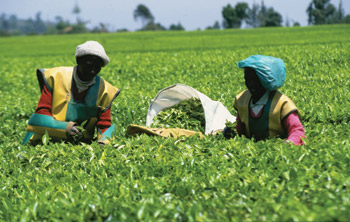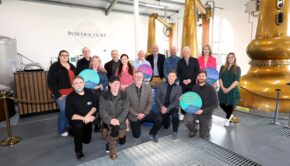A journey to sustainability

The world’s largest tea company tells the world about its sustainability commitments and its newly founded partnership with the Rainforest Alliance
13 October 2008
I’ve always known that big brands take communication seriously and have no fear of using the media to ‘message’ their consumers. However, when Unilever flew me all the way to Kenya so I could experience first hand the backbreaking work of a tea plucker, I thought this is taking the concept of ‘using the media’ to a new level.
In all seriousness, what I did learn was that Unilever is trying to take its business to a new level, developing its existing programmes of sustainability and CSR by partnering with the Rainforest Alliance. Certification requires adherence to around 100 criteria covered within the 10 principles of the Sustainable Agriculture Standard, an operating standard developed and revised by nine NGOs including the Rainforest Alliance, which deals with everything from social and environmental management to community relations.
So why is Unilever doing all this and with a certification body that is relatively unknown? And why ship the editor of ShelfLife all the way to its Kericho tea estate, when it’s already all over the telly?
The importance of the Irish market
Well, the fact that it’s on the telly in Ireland is precisely why we (a selection of Irish journos) had to see this for ourselves. Lyons, the biggest-selling tea brand in the country, has just launched its Rainforest Alliance communications this summer – the TV ad features the same Kenyan estate on which our media tour descended. Coupled with this is the fact that Ireland has the highest per capita consumption of tea in the world, and in terms of presence, “Lyons has similar scale in Ireland as Lipton does in Europe,” I’m told by Keith Farrell, Lyons brand manager, Ireland. So this is an important link in the value chain.
About two years ago, Unilever’s European team came to Ireland to talk to the Lyons arm of the business and see if it could get involved with the Rainforest Alliance initiative. “We manage Lyons as a local business, ” says Farrell, talking about how they became part of the global project, “We very soon realised it was something we absolutely had to do.”
Over the next number of months, Lyons carried out its own extensive market research, to see how ‘ethical consumerism’ was impacting on shoppers in Ireland. Most notable was that, while the “Fairtrade phenomenon” had made considerable inroads, there was much less awareness of the Rainforest Alliance.
Farrell said there was also a considerable gap between consumer attitudes and behaviour in relation to ethical consumerism, and Lyons ultimately saw an opportunity for the brand: “We wanted to break that cycle.”
In general, all were agreed that this was “a perfect fit for Lyons”, giving loyal customers another reason to enjoy their favourite brand of tea, and giving those who didn’t have any particular loyalty to the brand a reason to switch.
Most importantly, the communication strategy, including the media tours to Kenya, was designed to head off any potential naysayers or accusations of ‘green-washing’ that might detract from the company’s expensive initiative, and its considerable marketing potential. A fatal mistake made by other global brands who thought it would suffice to simply run one range or one ‘ethical’ product amongst their otherwise less than ethical portfolios.
On a journey
Out in Kericho, which is breathtakingly beautiful, the assembled journalists were corralled for a debriefing at the training centre on the tea estate. Although Unilever’s own tea business has had a sustainability programme in action for 10 years, it buys 90% of its tea from outside of its own business.
“I can’t give you the same guarantees for those other producers,” says Michiel Leijnse, global brand development manager Lipton, “And that’s one of the reasons that we’ve never talked about it in public. We want to be able to make the same claims that we make about Kericho about our whole supply chain. And that’s where certification comes into play.”
Unilever accounts for 11% of tea production in Kenya, the rest is produced mostly (62%) by small farm holders, of which there are over 450,000. As mentioned before Unilever only produces a relatively small quantity of the tea used in its blends, the rest it buys from smallholders directly and at auction. 20% of the blend in Lyons tea comes from Unilver Tea Kenya.
So attempting to guarantee the high standards it set for itself along its entire supply chain is a vital step in order to have a truly meaningful sustainability proposition, not to mention a very complex and challenging one. The biggest challenge, of course, is getting the small farms audited and certified, “There’s no guarantee they’ll pass,” says Leijnse, “There’s a lot of work that needs to be done.” Unilever has set itself the target of achieving this mammoth goal by 2015.
One small advantage is that smallholders can apply for certification in groups, as opposed to applying individually, for instance through co-operatives like the KTDA (Kenyan Tea Development Agency). For certification, the Rainforest Alliance audits the management system of the group and a sample of farms from within it also; “It’s a very standard way for smallholders to access a certification process,” explains Edward Millard, senior manager sustainable landscapes, Rainforest Alliance.
Under pressure
Given the scale of a business such as Unilever compared with a small organisation such as the Rainforest Alliance, some people might suspect that there’s pressure on the certification body to meet the goals of its industry partner. Millard explained that this is precisely how it should work: “Yes, if you use the word “pressure.” Unilever, as a market leader, makes a commitment, a global commitment, and it has a supply line. It’s in the interests of Unilever to meet its brand-led plan, to be able to bring this supply line into certification within the parameters of that plan.
“For that to happen, those independent suppliers have to take the decision to apply for and obtain certification. So Unilever has market power and is able to exert influence on those suppliers, which of course is a huge market opportunity for us and for the principles that we stand for.”
Therefore, Unilever’s initiative has resulted in a rush to improve standards and become certified, including eight companies in India, who are currently applying for an audit. “Now how long would it have taken us to persuade eight tea suppliers in India, where we don’t have presence yet, to come into our system?” asks Millard.
Sustainable benefits
So Rainforest Alliance itself, as an up-and-coming NGO, benefits from the partnership with Unilever, helping it spread awareness of its tropical agriculture principles in different regions and consumer markets. “We decided that Rainforest Alliance was the right scheme for us,” says Leijnse, “It was more important to go with the right partner and start building it together than to go with a partner with good awareness but that didn’t fit.”
Very important for Unilever also is the fact that Rainforest Alliance certification centres on a market-based premium for growers, rather than a fixed premium. “If you give a fixed premium you’re going to be subsidising over-production” which is a dangerous (and unsustainable) proposition in a market where there is already over-production. “We want to use the power of the market to reward good producers, who produce efficiently and produce good quality tea that people want to buy, in a sustainable way,” Leijnse commented.
The major benefit of Unilever’s Rainforest Alliance initiative is that it will drive improved standards across the worldwide industry; improving production and environmental management, improving health and safety and conditions for workers, improving market opportunities for small, disadvantaged growers, and ultimately improving quality of life in developing countries. And because the rewards are market-based, it is sustainable.
The sustainable benefit of Rainforest Alliance certification for Unilever is several fold. Firstly, meeting the standard requires a business to drive efficiencies across its entire model, resulting in plentiful savings. Secondly, it allows Unilever brands, such as Lyons and Lipton, to gain access to new market channels, for instance through other Rainforest Alliance partners, such as McDonalds. But lastly, and most importantly, “We hope this will help us to build brand loyalty and grow sales,” says Leijnse.
In Ireland, Lyons took its message to the Electric Picnic and the National Ploughing Championships, targeting the critical 25 to 45 demographic. And messaging is strongly underway through a range of visual media, especially the 40 second and 20 second television ads shot on location at Kericho.
It may take time but Unilever, and Lyons, are very confident they will see a return on their investment. A win, win, win situation, which is aim of all true sustainability initiatives.



 Print
Print






Fans 0
Followers